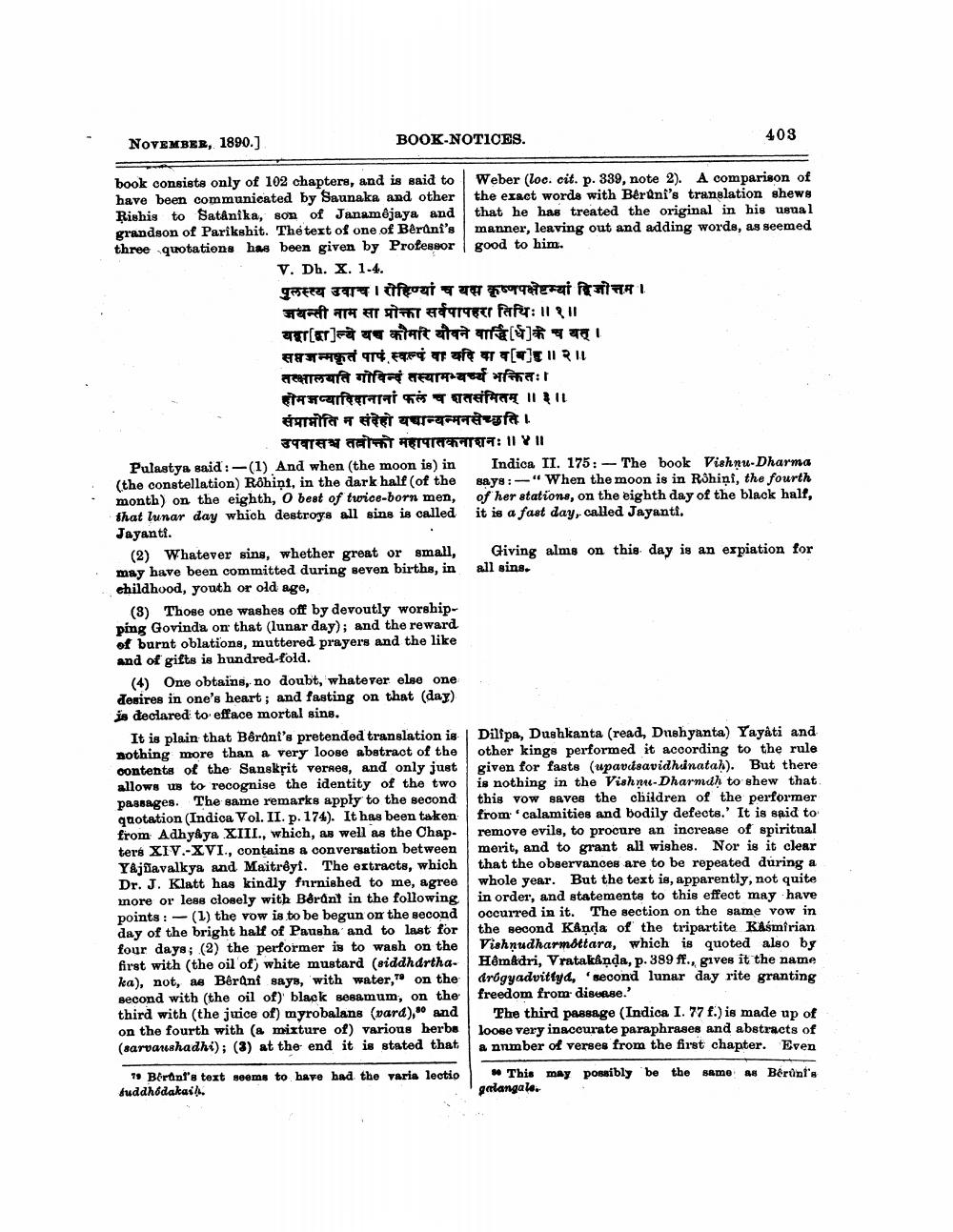________________
NOVEMBER, 1890.]
BOOK-NOTICES.
403
book consists only of 102 chapters, and is said to Weber (loc. cit. p. 389, note 2). A comparison of have been communicated by Saunaka and other the exact words with Bêræni's translation shews Rishis to Satânika, son of Janamêjaya and that he has treated the original in his usual grandson of Parikshit. The text of one of Bêrdni's manner, leaving out and adding words, as seemed three quotations has been given by Professor good to him.
V. Dh. X. 1-4. पुलस्त्य उवाच । रोहिण्यां च बझ कृष्णपक्षेष्टम्यां द्विजोत्तम । जयन्ती नाम सा प्रोक्ता सर्वपापहरा तिथिः॥१॥
[#]a ft (SH TI
तक्षालयति गोविन्दं तस्यामभ्यर्च्य भक्तितः। होमजयादिवानानां फलं च शतसंमितम् ॥३॥ संपामोतिन संदेहो यच्चान्यन्मनसेच्छति ।
उपवासश्च तत्वोक्तो महापातकनाशनः ॥४॥ Pulastya said: -(1) And when the moon is) in Indica II. 175:- The book Vishnu Dharma (the constellation) Rôhiņi, in the dark half (of the says:-"When the moon is in Rəhiņi, the fourth month) on the eighth, O best of twice-born men, of her stations, on the eighth day of the black hall, that lunar day which destroys all sins is called it is a fast day, called Jayanti. Jayanti.
(2) Whatever sins, whether great or small, Giving alms on this day is an expiation for may have been committed during seven births, in all sins. childhood, youth or old age,
(8) Those one washes off by devoutly worshipping Govinda on that (lunar day); and the reward of burnt oblations, muttered prayers and the like and of gifts is hundred-fold.
(4) One obtains, no doubt, whatever else one desires in one's heart; and fasting on that (day) is declared to efface mortal sins.
It is plain that Bêräni's pretended translation is Dilipa, Dushkanta (read, Dushyanta) Yayati and nothing more than a very loose abstract of the other kings performed it according to the rule oontents of the Sanskrit vernes, and only just given for fasts (upavuisavidhinatah). But there allows us to recognise the identity of the two is nothing in the Vishnu-Dharma) to shew that passages. The same remarks apply to the second this vow saves the children of the performer quotation (Indica Vol. II. p. 174). It has been taken from calamities and bodily defects.' It is said to from Adhyâya XIII., which, as well as the Chap- remove evils, to procure an increase of spiritual ters XIV-XVI., contains & conversation between merit, and to grant all wishes. Nor is it clear YAjlavalkya and Maitreyi. The extracts, which that the observances are to be repeated during a Dr. J. Klatt has kindly furnished to me, agree whole year. But the text is, apparently, not quite inore or less closely with Bêrant in the following in order, and statements to this effect may have points: -(1) the vow is to be begun on the second occurred in it. The section on the same vow in day of the bright half of Pausha and to last for the second Kanda of the tripartite Kaśmirian four days; (2) the performer is to wash on the Vishnudharmóttara, which is quoted also by first with the oil of) white mustard (siddhartha- Hêm&dri, Vratakanda, p. 389 ff., gives it the name ka), not, as Bérant says, with water, ta on the arogyadvittyd, 'second lunar day rite granting second with (the oil of) black sesamum, on the freedom from disorse.' third with (the juice of) myrobalans (vard),"" and The third passage (Indica I. 77 f.) is made up of on the fourth with a mixture of) various berbaloose very inaccurate paraphrases and abstracts of (sarvarshadhi); (3) at the end it is stated that a nnmber of verses from the first chapter. Even
15 Borant's text seems to have had the varia lectio This may possibly be the same Bérünt's fuddh6dakail.
galangale.




